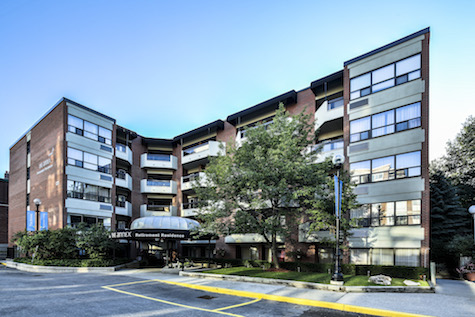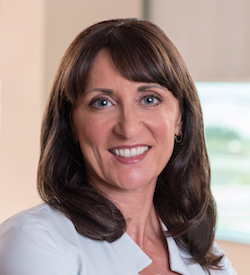
Could a ride-hailing program unlock resident and staff satisfaction by offering a solution to transportation challenges experienced by senior living communities?
A senior living and long-term care provider based in Canada is pilot-testing a new platform to find out. Early results are promising — and the program recently became available to all businesses in the United States.
For approximately the past two months, Revera has been testing UberCentral at The Annex, its 98-bed independent living community in Toronto. The service lets businesses order rides for people who don’t necessarily have the smartphones and Uber accounts usually required to order a ride from Uber’s independent-contractor drivers.
 “We’re still gearing up, but many of the residents have used it,” Patricia Barbato (pictured), senior vice president, innovation and strategic partnerships at Revera, told McKnight’s Senior Living. Even taxis can be ordered through the service, she added.
“We’re still gearing up, but many of the residents have used it,” Patricia Barbato (pictured), senior vice president, innovation and strategic partnerships at Revera, told McKnight’s Senior Living. Even taxis can be ordered through the service, she added.
Revera set up the UberCentral account, and residents of The Annex schedule rides through the receptionist. Uber bills Revera for the rides, and Revera places the charges on residents’ monthly bills.
Pilot-testing at The Annex will last another month or so, Barbato said, and then Revera plans to expand use of the platform to four other communities, potentially widening its use to all Revera communities, depending on the results of its tests. The company owns or operates more than 500 communities in Canada, the United States and the United Kingdom.
Anecdotal evidence to date shows promise for the ride-hailing service, she said.
“I spoke to a couple of our residents just the other day about it,” Barbato said. “One of them said she really enjoys interacting with the driver. She loves how fast it is. She calls, and there’s someone there within two to three minutes. And she loves that the bill is just tacked on to her monthly statement, so she doesn’t worry about anything. It’s very, very seamless and smooth.”
Another resident, Barbato said, appreciates that she is able to transport her show dog various places without having to rely on family or friends. “She just says at the onset that the driver needs to accept pets,” Barbato said.
So UberCentral appears to be a tool that could help senior living providers realize goals at the heart of the sector, Barbato said.
“We need to provide a better experience,” she said. “We need to provide choice. We need to help residents remain as independent as possible for as long as possible. It’s our responsibility and obligation.”
How it works
UberCentral is designed to be accessible via any tablet or web browser. Businesses can request multiple rides from the same account. The person who is administering the account for the business enters the rider’s name, phone number, pickup address and destination. The administration can keep track of trips from one central place. Several business locations can be included under one account, enabling the business to centralize billing and reporting.
At The Annex, residents arrange for rides through the receptionist, so an important step in offering the service was familiarizing her with Uber, Barbato said.
“She had never used an Uber, and she was scared of using it,” she said. “Uber gave her free rides anywhere she wanted for a week, just so that she could experience it herself. Now she’s become a complete advocate, which makes her a good person to help our residents look at the technology as an option and see what it looks like. That actually was a really good learning for us.”
Employee transportation
In addition to using UberCentral for resident rides, The Annex has tested the platform for employees who need to travel to another site, to a hospital to visit a resident and for other work purposes, Barbato said. “That gets billed to us,” she added.
“Looking at the convenience of not paying mileage, not paying parking fees and comparing that — so far, it’s very positive,” Barbato said. “The employees are loving it because it’s much easier for them not to drive, especially where this pilot is, which is Toronto.”
That employee satisfaction makes the ride-hailing service a potential aid in worker retention, she said.
“We have an aging demographic in our employee base. I think our average age for frontline staff right now is around 49 or 50,” Barbato said. “So that’s definitely something that we need to be continually aware of — how we can make their jobs less labor-intensive.”
Other uses
Revera also is interested in determining whether the platform can benefit the company in less-populated areas, Barbato said.
“We have some hard-to-serve areas, more rural areas, and it’ll be interesting to see if we can work with them around recruiting drivers for areas that are hard to service, so that you make that match,” she said.
Revera also plans to test UberCentral to order larger or multiple vehicles simultaneously to take residents to group activities planned by a community, Barbato said.
“There are often external events — going to the theater, going to the casino — and it can be difficult to manage fluctuating numbers or changes that happen at the very last minute. You might order a bus for 12 people but you need a bus for 20,” she said. “So the next phase that we’re going to be piloting is looking at what happens if we use this as an alternative. How much does it cost us, one over the other? What is the satisfaction level of our residents? What is the satisfaction of our staff? Does it make their lives easier and give them more time?”
In the United States
Revera is the only senior housing or residential long-term care provider in North America to work directly with Uber to test the platform. Early testers of UberCentral in the United States include three organizations that serve seniors, however, an Uber representative told McKnight’s Senior Living.
Among those organizations is Atlanta-based Common Courtesy, a nonprofit that promotes mobility by facilitating UberCentral accounts for individuals and organizations. One of Common Courtesy’s organizational users, according to its website, is Clairmont Crest, an affordable independent and assisted living community for those aged 50 or more years that is located in Decatur, GA, and is part of Baptist Retirement Communities of Georgia.
Other UberCentral pilot-testers in the United States include the Dorothy C. Benson Senior Multipurpose Center, a senior center in Atlanta, and 24Hr HomeCare, a Los Angeles-based home care provider with 13 locations in Arizona, California and Texas.
UberCentral became available to all U.S. and Canadian businesses on July 28. Businesses can learn more and sign up for free at https://uber-central.com/.



